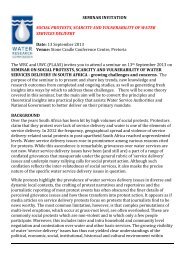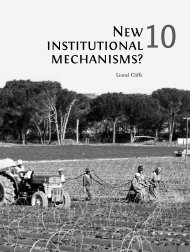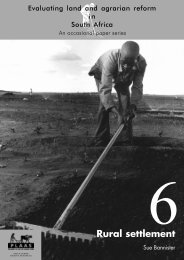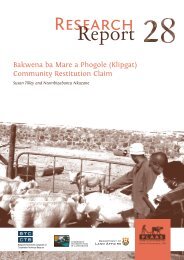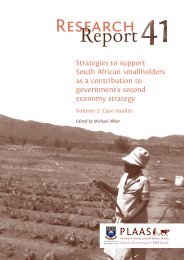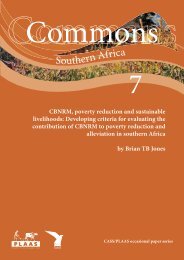You also want an ePaper? Increase the reach of your titles
YUMPU automatically turns print PDFs into web optimized ePapers that Google loves.
Why the agri sa walkout at the summit shouldnot matterAgri SA walking out of the VulnerableWorker Summit was disappointing, butnot surprising to those of us who haveengaged them over time. The walkout wasmainly sparked by Agri SA taking offenceat farm workers’ repeated assertions at theSummit that they experience widespreadrights violations, contrary to the staple AgriSA line that farmers are by and large lawabiding,except for a ’few rotten apples‘.Agri SA missed the main point of thediscussion, which is not about whetherindividual farmers are ‘good’ or ‘bad’people, but rather a plea to urgentlytransform a production system that robsmost sector workers of any opportunity todream of or realise their constitutional rightto a life of dignity for themselves and theirchildren.Farm worker organisations have goneto great lengths over the years toprovide evidence (research on evictions,documentaries on pesticide poisoning,protest actions and media opinion piecessuch as these) to support the assertion thatSouth African farm workers in the twentyfirstcentury still live in a system of virtualslavery. But the onus should be on farmersto prove their claims that contradict popularfarm worker experience. Without proof toback the claims, Agri SA still maintains thatall is largely well on South African farms. Ifthis is indeed the case, they should be opento the repeated calls to set up open andtransparent farm worker rights monitoringand evaluation mechanisms, withrepresentation from legitimate farm workerorganisations, rather than the plethora offarmer-puppeteer farm worker structurescurrently mushrooming on farms.Agri SA insists it will deal with any rightsviolations reported to it. However, itrejects out of hand the extensive record ofwide-scale violations covered in the 2003South African Human Rights Commission’sinvestigation into conditions on farms;Agri SA has done nothing further to dealwith these abuses. Even if rights violationsare reported to the organisation, it isnot accountable to anyone. When Leeu-Gamka farmer Piet Botes was found guiltyof raping and murdering 13-year-oldElizabeth Martiens, the daughter of oneof his workers, Agri Western Cape did notmake public whether Botes was a memberor not. Similarly, Agri SA is silent about thespate of road accidents involving unsafetransportation of farm workers on the backof open vehicles, in violation of many trafficlaws. Agri SA has repeatedly resisted callsto make its membership list public so thatso-called ‘bad apples’ can be rooted out. So,how serious can the organisation be?The continuous refrain throughout theSummit was, ‘So what’s new?’ Havingattended the 2005 Land Summit and the2008 Consultative Conference on Agriculturein Polokwane, many resolutions did indeedsound very familiar. However, despite AgriSA’s walkout, the Summit nonethelessmade some potentially ground-breakingresolutions.In addition to affirming the resolutions ofthe 2005 Land Summit (including abandoningthe willing-buyer, willing-seller approachto land reform), the Summit alsoadopted a decision to establish agriculturalbargaining councils. Farmer unions have alwaysopposed this, without giving any reasonswhy commercial agriculture should beexempt from establishing a labour rightsmechanism – the norm in almost all othersectors. If realised, agricultural bargainingcouncils will be a significant step forward torealising farm worker rights. Currently, unionshave to embark on individual farm-byfarmnegotiations. With more than 40 000farms in South Africa (where workers earnlow minimum wages with correspondinglylow union subscription fees and resultantunder-resourced unions), a centralised agriculturalbargaining council would go a longway towards freeing union officials to undertakethe education and rights defencework so urgently needed by workers.The Summit also adopted a resolution todevelop a sector-wide comprehensive genderequity strategy. Systemic and historicdiscrimination against women workers hasdeepened due to increased casualisationand outsourcing through labour brokers.Even in 2010, a woman’s position on a farmis still largely determined by her relationshipto a male farm worker. Women areseen quite literally an extension of maleworkers and an auxiliary source of labourto be drawn on as needed in high seasons.This restricts women’s ability to engagein off-farm employment, as they must beavailable when the farm needs them.While such feudal labour practices arenot formally written in contracts, certain– mostly higher paying – positions arereserved for men. Their labour on the farmis valued less than that of men and usuallynot accorded high status in the farm workerhierarchy. With her perceived “nimblefingers”, the female worker is restricted tolower-status functions on a farm. Womenare thus discriminated against both in the2 January 2011 A bulletin tracking land reform in South Africa



